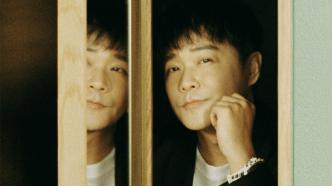
2024 marks the tenth year that Chen Sicheng, who started out as an actor, has turned to directing. Over the past decade, he has made his debut with Beijing Love Story, and has successfully created the first domestic series of original IP models with three consecutive Detective Chinatown films, not to mention the Manslaughter series of films he produced, as well as last year's summer hit The Vanishing Girl and the Lunar New Year champion The Third Squadron. The astonishing box office success has made Chen Sicheng recognized by the industry as the person who "masters the wealth code of movies."
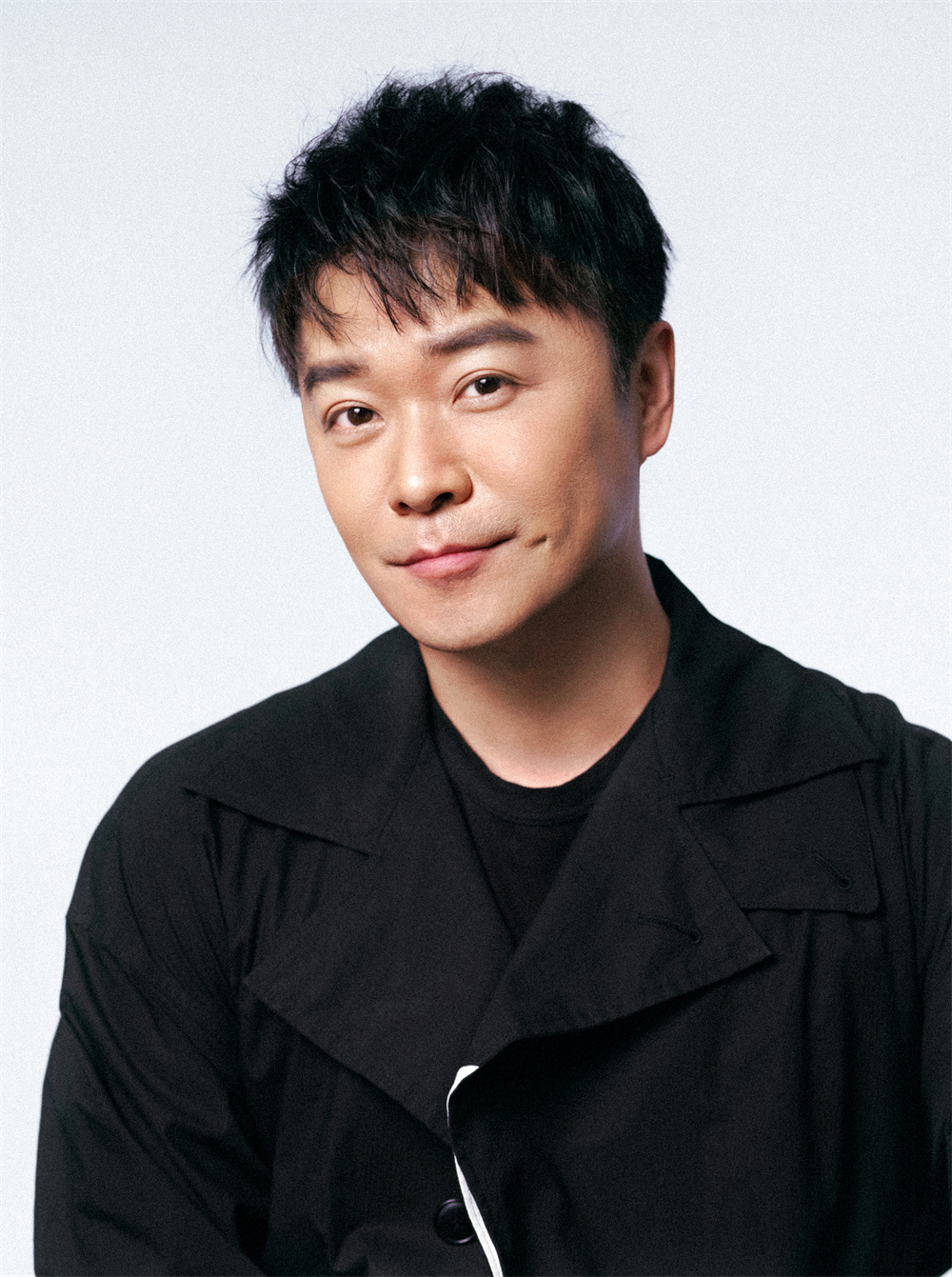
Chen Sicheng
The 2024 summer season is two-thirds over. On August 3, as a seed player of the season, the new work "Decryption" written and directed by Chen Sicheng debuted with great momentum.
The movie "Decoded" is adapted from the world-renowned novel of the same name by Mao Dun Literature Prize winner Mai Jia. Chen Sicheng also said that in this creation, "I am standing on the shoulders of (literary) giants". Before the movie was released, the Film Association, Writers Association and Federation of Literary and Art Circles held a special observation and seminar for "Decoded". Chen Sicheng's speech at the meeting was powerful, "In terms of the audio-visual and experience of the entire film, we strive to pursue the highest standards within our capabilities. I hope that through this movie, we can tell everyone that Chinese filmmakers can make blockbusters that are not inferior to Hollywood production standards."
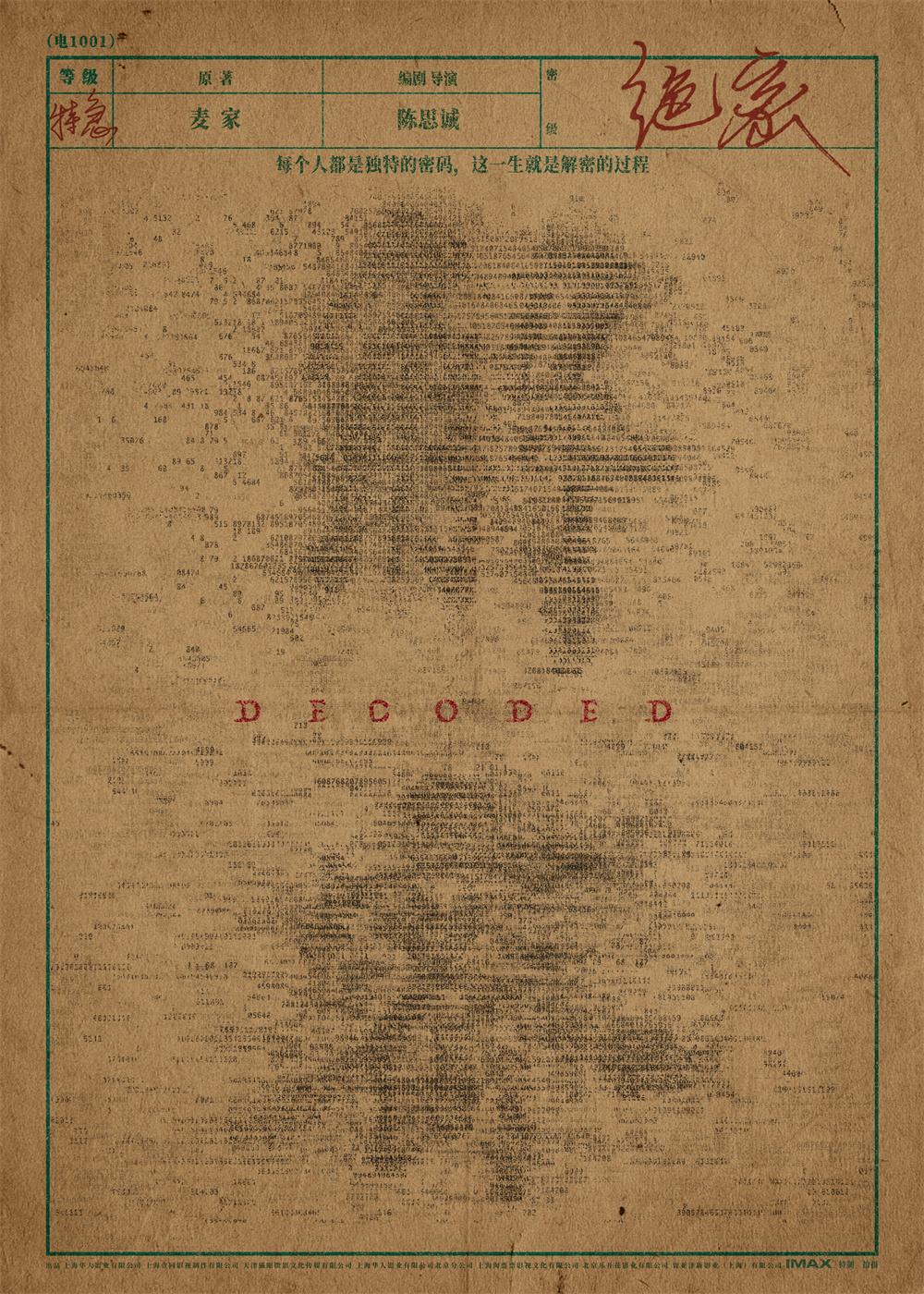
Movie "Decryption" coded paper poster
To be fair, the phrase "a blockbuster that is not inferior to Hollywood production standards" seems to be rarely mentioned during the promotion of domestic films in recent years. As for this year, "The Decryption" is not only the most blockbuster-like blockbuster of this period, but also the most blockbuster-like blockbuster of the year. The all-star cast on and off the stage, the whole process of IMAX special shooting, and the soundtrack recorded in Vienna, the music capital... Even from the pre-screening trailers, the audience will feel the grandeur and shock of the construction of the ten dream scenes in "The Decryption".
When it comes to "benchmarking" Hollywood, it also reminds people that ten years ago, as one of the first members of the "China-US Film Talent Exchange Program" launched by the State Film Administration, Chen Sicheng went to Hollywood to observe, learn and exchange business. At the Beijing premiere of "Decryption", Wang Baoqiang's speech reflected this, "Sicheng spent all the money he earned from making movies over the years on movies. After going through the entire film process... I think he was born for movies."
The friend's excited and vague words aroused the interest of the reporter from The Paper. We chose "Yiyiheguang" as the location for this interview with Chen Sicheng, a production base founded by him that "provides one-stop services for the entire post-production process for Chinese-language films and TV series." This nearly 6,000-square-meter single-family red brick building is located in the Langyuan Cultural and Creative Industrial Park in the suburbs of Beijing. Similar to the predecessor of another cultural and creative park, 798, which served industrial production, it was once a Beijing textile warehouse in the 1960s.
The current "Yiyiheguang" post-production base is equipped with Asia's top equipment and facilities such as Dolby VISION color grading studio, CINITY color grading studio, and Dolby Atmos mixing platinum studio. Since it was put into operation in 2022, many popular works such as "The Vanishing Girl", "In the Octagonal Cage", "The Third Brigade", "Article 20", "The First Part of the Conferred God", "Hot", and "Deep Sea" have completed (or partially completed) post-production here. Movies are the art of dreaming, and this dream-filled "Decryption" also finally turned dreams into reality here.
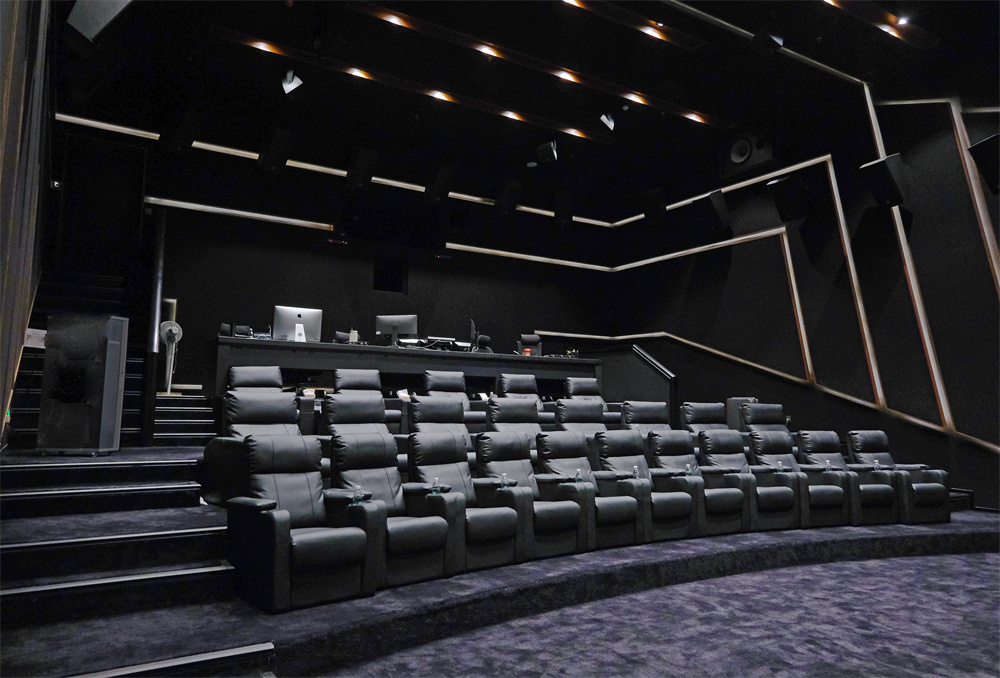
Dolby VISION color grading studio. Image provided by Yiyi Heguang

Recording center. Image provided by Yiyiheguang
Different from the modern technology texture in the orderly work department, Chen Sicheng's office is decorated with a Zen style. Why choose a literary masterpiece to adapt into a movie? Perhaps we can get a glimpse of it from his collection: Jin Yong's inscriptions, Lao She's calligraphy, Einstein's handwritten letters to his wife, Ando Tadao's hand-painted design of the "Church of Light", John Lennon's most classic anti-war song "Imagine" gold record... and so on.
Since this movie originated from literature, our conversation naturally started with literature.
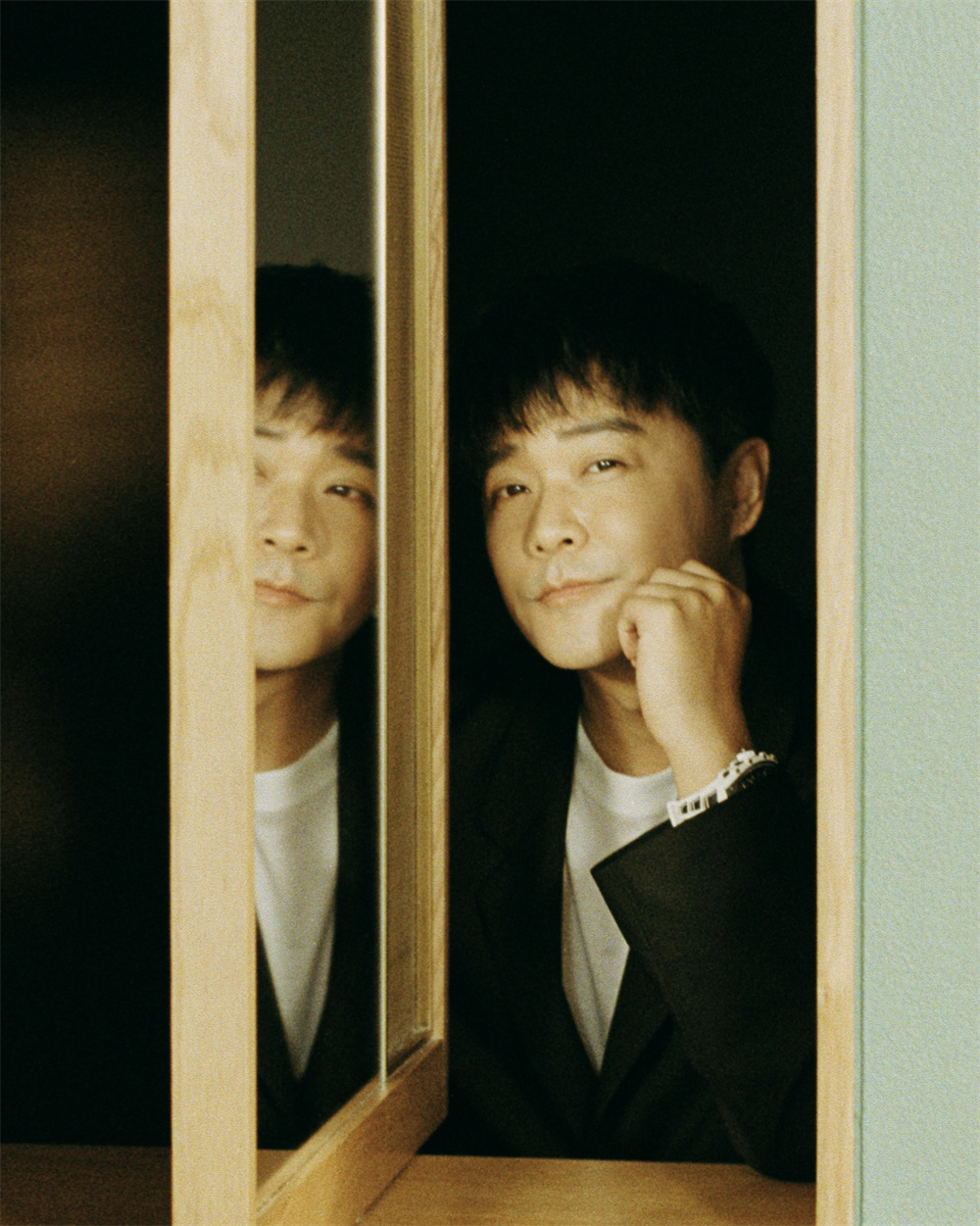
Chen Sicheng
【dialogue】
“I value the nourishment of literature.”
The Paper : Let’s put aside “Decoding” for now. I want to ask about the stories behind the two collections in the office: the autographed photo of Russian literary giant Tolstoy and Gu Cheng’s poem manuscript “I am a wayward child” (fragment). In fact, from the perspective of talent and purity, Gu Cheng and Rong Jinzhen, the protagonist of “Decoding”, are quite similar.
Chen Sicheng : I only collect things that I like or that have influenced me. I bought (and sold) the autographed photo of Leo Tolstoy. I read almost all of this literary giant’s works when I was in middle school. I watched the old Soviet movie Anna Karenina on TV that year and was deeply impressed. Then I found the original novel and read all his works.
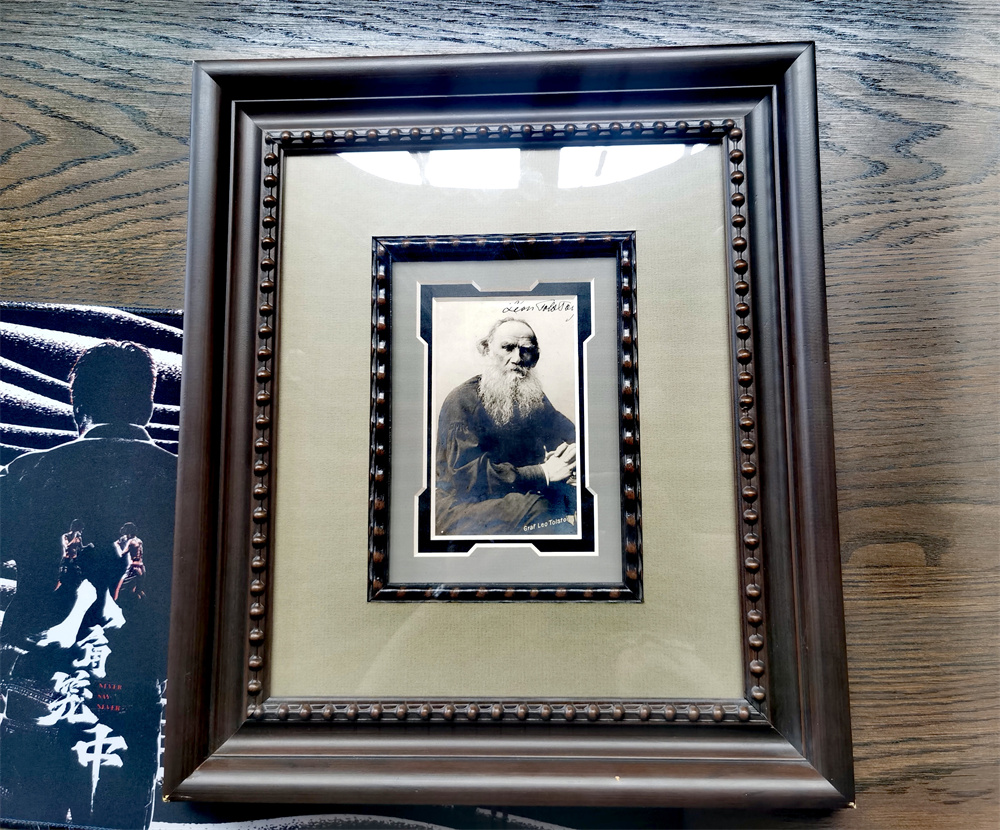
Chen Sicheng's collection of autographed photos of Russian literary giant Leo Tolstoy. Photo by Thepaper.cn reporter Wang Zheng
Let's talk about Nekhlyudov and Maslova in "Resurrection". He had an affair with her and then abandoned her. As a juror, he saw her on trial and felt guilty about marrying her. Then he went into exile with her. This story moved me deeply. I realized at that time that human nature is complex and not something that can be achieved overnight. It is not black and white. This creative concept has influenced me to this day. I like Gu Cheng's poems because he observes and describes the world from a child's perspective, and Rong Jinzhen in the movie is actually a "child". Another reason why I collect these people's collections is that they are all geniuses in their respective fields.
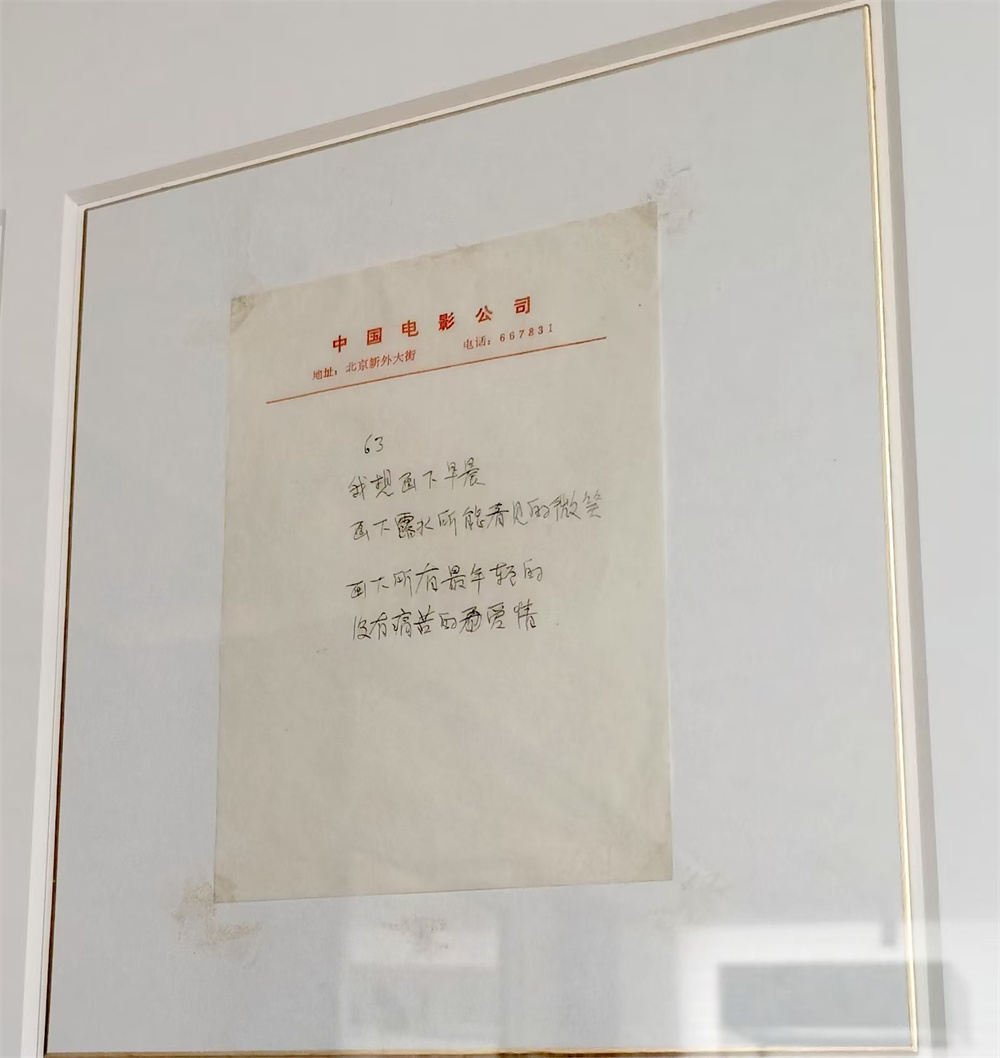
Chen Sicheng's collection of Gu Cheng's poems. "I am a willful child" (excerpt): "I want to paint the morning, the smile that can be seen in the dew; I want to paint all the youngest, painless love." Photo by Wang Zheng, a reporter from The Paper
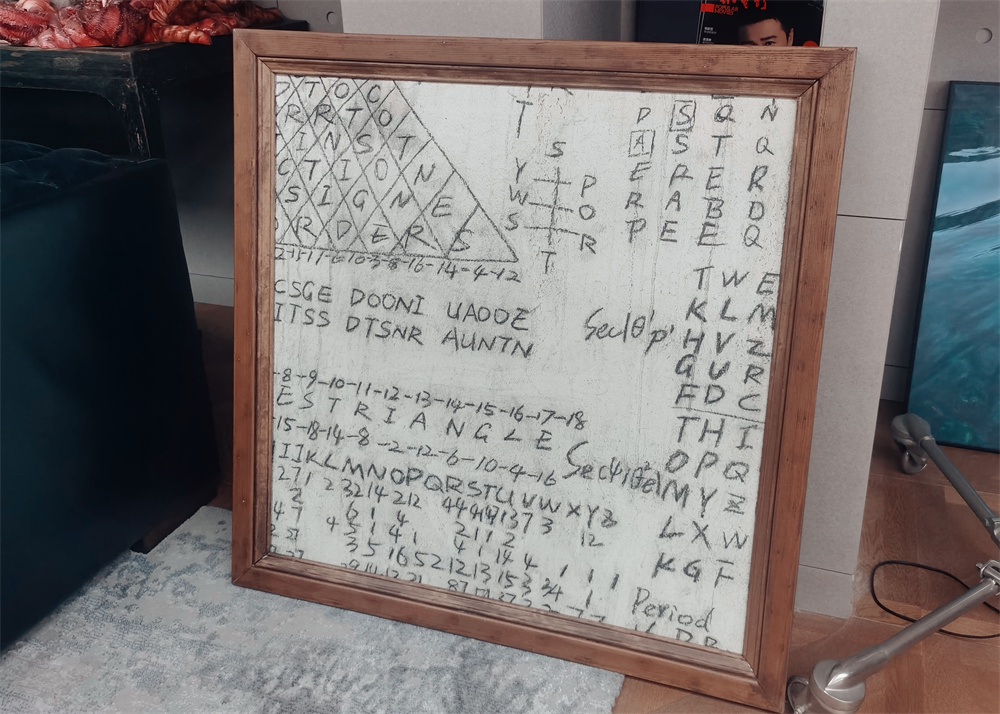
A new collection in Chen Sicheng's office: After the filming of "Decryption" was completed, a piece of wall that Rong Jinzhen calculated on the wall was framed. Photo by Wang Zheng, a reporter from The Paper
The Paper : How do you define genius?
Chen Sicheng : Geniuses are people who are closer to the truth and essence of this world. Whether it is John Lennon who can write such amazing melodies, or Einstein who can discover the theory of relativity, I think they all came to this world with their own sense of mission to reveal part of the truth of this world to us.
The Paper : Mai Jia commented that the movie “Decoded” was the most satisfying film and television adaptation of his works, and he also spoke highly of your literary accomplishment. Can you talk about your communication with him?
Chen Sicheng : To be honest, I started to enter the temple of literature from martial arts novels. I first read Jin Yong's novels, "Flying Snow and Shooting White Deer, Laughing Book and Heroes Relying on Green Mandarin Duck" all in one go, and then I became more interested in Gu Long's "Chu Liuxiang" and "Lu Xiaofeng" series, as well as Wen Ruian's "Four Famous Detectives". For children who are educated for the test, these are all miscellaneous books and leisure books.
After I finished reading all the martial arts novels I could find, I started looking for those big novels. During class, I read "Sense and Sensibility" and "Wuthering Heights". When I went to college, reading leisure books became my major. For example, the Central Academy of Drama had a half-year acting class on novel adaptation. My literary reserve was richer than that of my classmates. When I chatted with Professor Mai Jia, he found that I knew the works of very obscure writers, so I had more related topics.
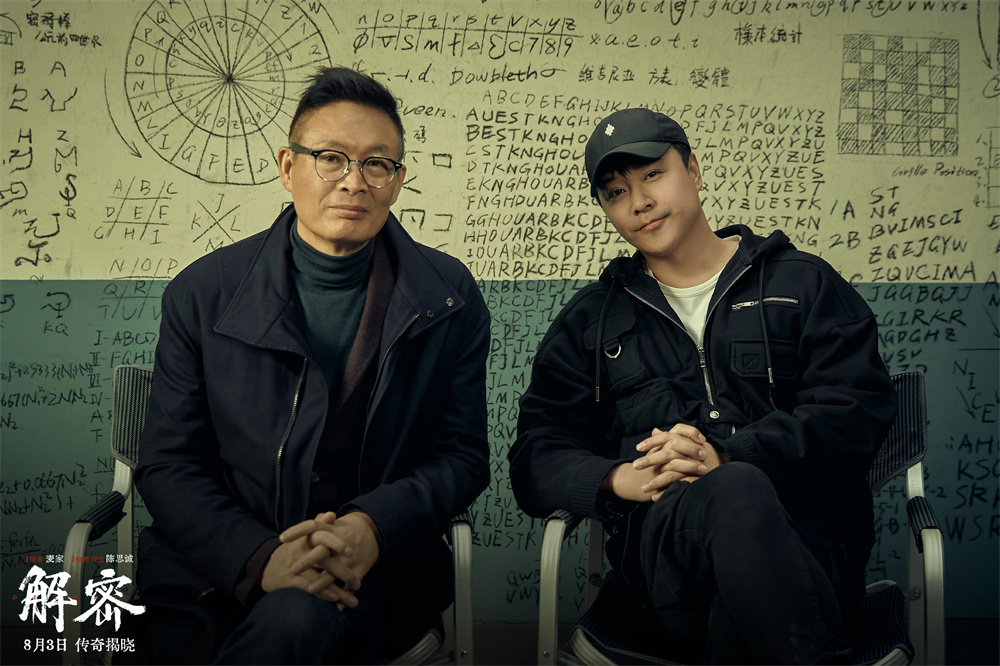
The author of the original novel of the movie "Decoding" Mai Jia and the screenwriter and director Chen Sicheng
The 1980s and 1990s were also the best time for contemporary Chinese literature, with a group of writers such as Mo Yan, Su Tong, Jia Pingwa, Yan Lianke, and Wang Shuo shining like stars. Moreover, the movies at that time also came from the soil of literature. It can be said that without Mo Yan, there would be no "Red Sorghum" (movie), without Li Bihua, there would be no "Farewell My Concubine", without Yu Hua, there would be no "To Live", and without Wang Shuo, there would be no "Sunny Days"... So whether I was studying acting, being an actor, or later becoming a director, I attached great importance to the nourishment of literature.
"The biggest change is that I let Rong Jinzhen die in the brilliance"
The Paper : Specifically speaking of the script of "The Decryption", you are ranked first in the screenwriter column. Please introduce the origin of this project.
Chen Sicheng : Actually, Chinese Films found me first. In 2020, they showed me the script of "Decoded" written by Canadian screenwriter Christopher McBride. I had read this novel a long time ago, and I thought it would not be easy to adapt it into a script.
After receiving the project of the movie "Decryption", I re-read the novel and found that there were some problems with the script written by the foreign screenwriter, and some important cores of the original novel were not reflected in the play. For example, he did not know much about China's history and national conditions, and he wrote a bit of a political thriller, which was too stereotyped.
But there is one thing, ENIAC, the world's first general-purpose computer, which was valued by both Schiess and Rong Jinzhen. I think it is also a point of great practical significance, so I kept it and expanded it at a considerable length. Computers represented an unknown to people at that time, just like we are now interested in where AI will lead us. We are both interested and afraid of it.
The Paper : Can you tell us what new content you added to Christopher McBride’s script?
Chen Sicheng : The previous scripts had bold imagination, but they were limited by his lack of understanding of our national conditions. The characters’ motivations behind the actions he gave were lacking, or the reasons he found were not reasonable. It was like a ball thrown far away, drawing a long parabola, and I had to pick up the ball and rewrite it.
I first adjusted the script back to the interview format. The original novel used the interview format, which I think is very clever and can also help the film's narrative. Another major adaptation is Rong Jinzhen's ending. In the movie, he died peacefully in his wife Xiaomei's arms after exhausting all his energy to crack the black code. In the novel and the previous script, Rong Jinzhen spent the rest of his life in a sanatorium. I don't know if I am more "cruel" or if Mai Jia is more "cruel"? Because I think geniuses should die brilliantly.
The Paper : In the novel “Decoded,” the themes of “mathematics” and “dream interpretation” are always intertwined. In fact, the two are difficult to reconcile, one is an ambiguous uncertainty, and the other is a strict certainty. Of course, we also know that many scientists in history finally believed in the existence of God, but putting it on the big screen will definitely face considerable challenges in terms of audience acceptance and interpretation. Can you talk about your understanding and solution?
Chen Sicheng : I think Rong Jinzhen carries the dual meaning of "decryption". Just like what Professor Mai Jia said, deciphering codes is just a channel. The core is not to decipher a mathematical code, but to understand and decipher the human heart. The code itself is a reflection of the designer's mind and thinking. Sometimes deciphering a code requires the intuition deep in the subconscious to perceive it, which is often the key to breaking through the last layer of window paper.
Filming the movie "Decryption" is very different from my previous works. The previous ones were more typological, but the clear genres would also constrain my imagination to a certain extent. This "Decryption" liberated my imagination. When I decided to put ten dreams in it, I knew that dreams were the most unique and challenging part of this movie during the script writing stage, whether in terms of the content itself or the final visual presentation, whether for Rong Jinzhen in the film or for us as the main creators outside the play.
For example, there is a dream scene in the movie, Rong Jinzhen and Xiaomei are in a huge Ferris wheel. I think this Ferris wheel should be destroyed. But how to present the Ferris wheel and the amusement park? During the discussion, I suggested to find images from the content, the beautiful things that appeared around Rong Jinzhen before -
For example, when he first arrived at the Rong family, he didn't know the etiquette and poured tea into the rice bowl and drank it all. In order not to embarrass him, the Rong family did the same. That teapot and rice bowl were engraved in Jin Zhen's heart.
Also, before he left the Rong family, he had been wearing the pen that Xiao Lili gave him before leaving.
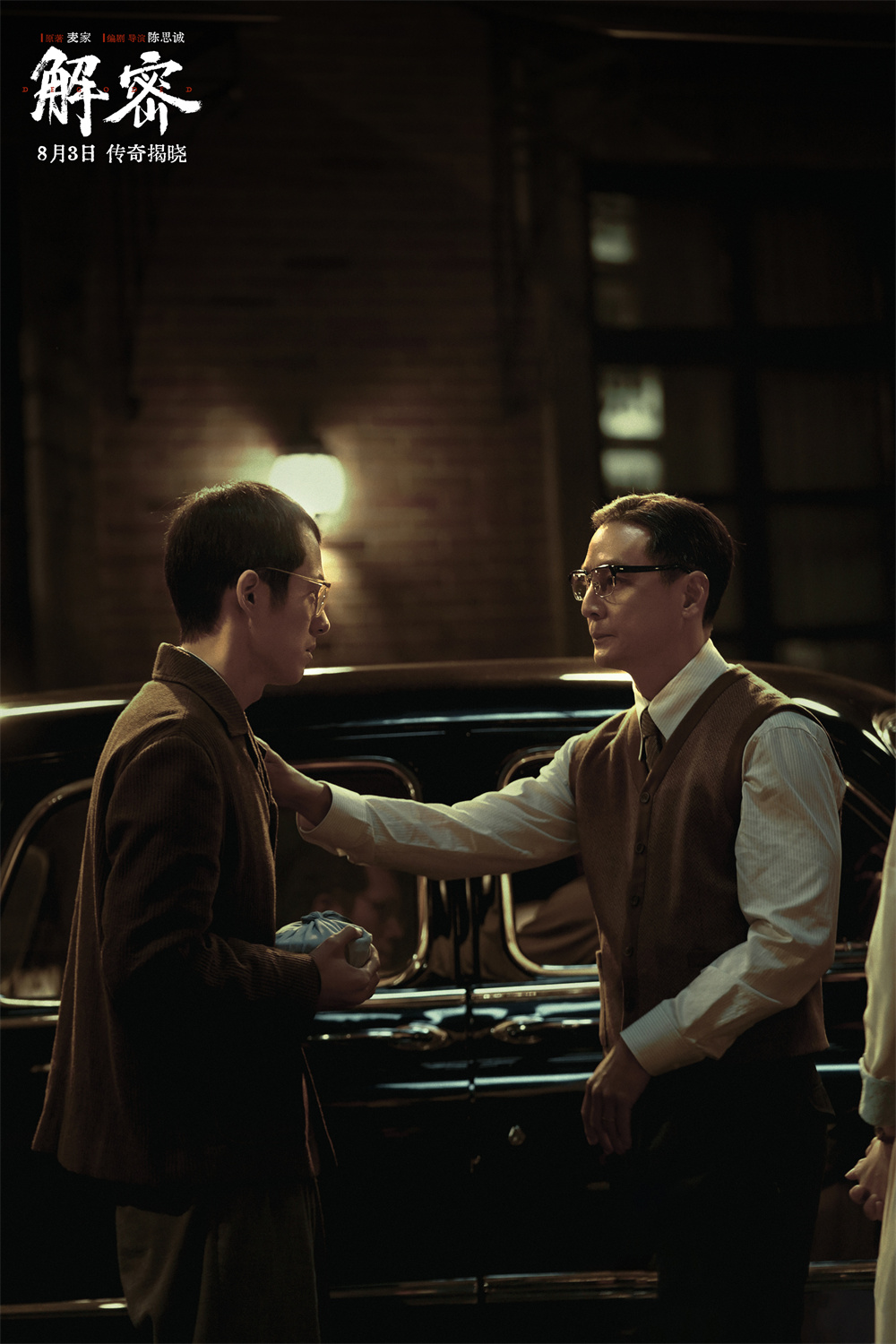
Rong Jinzhen solemnly bids farewell to his adoptive father Xiao Lili (played by Daniel Wu)
Another thing is that when Rong Jinzhen was studying, he often played chess with his teacher Xi Yis, and the chessboard and chess pieces they used were also there.
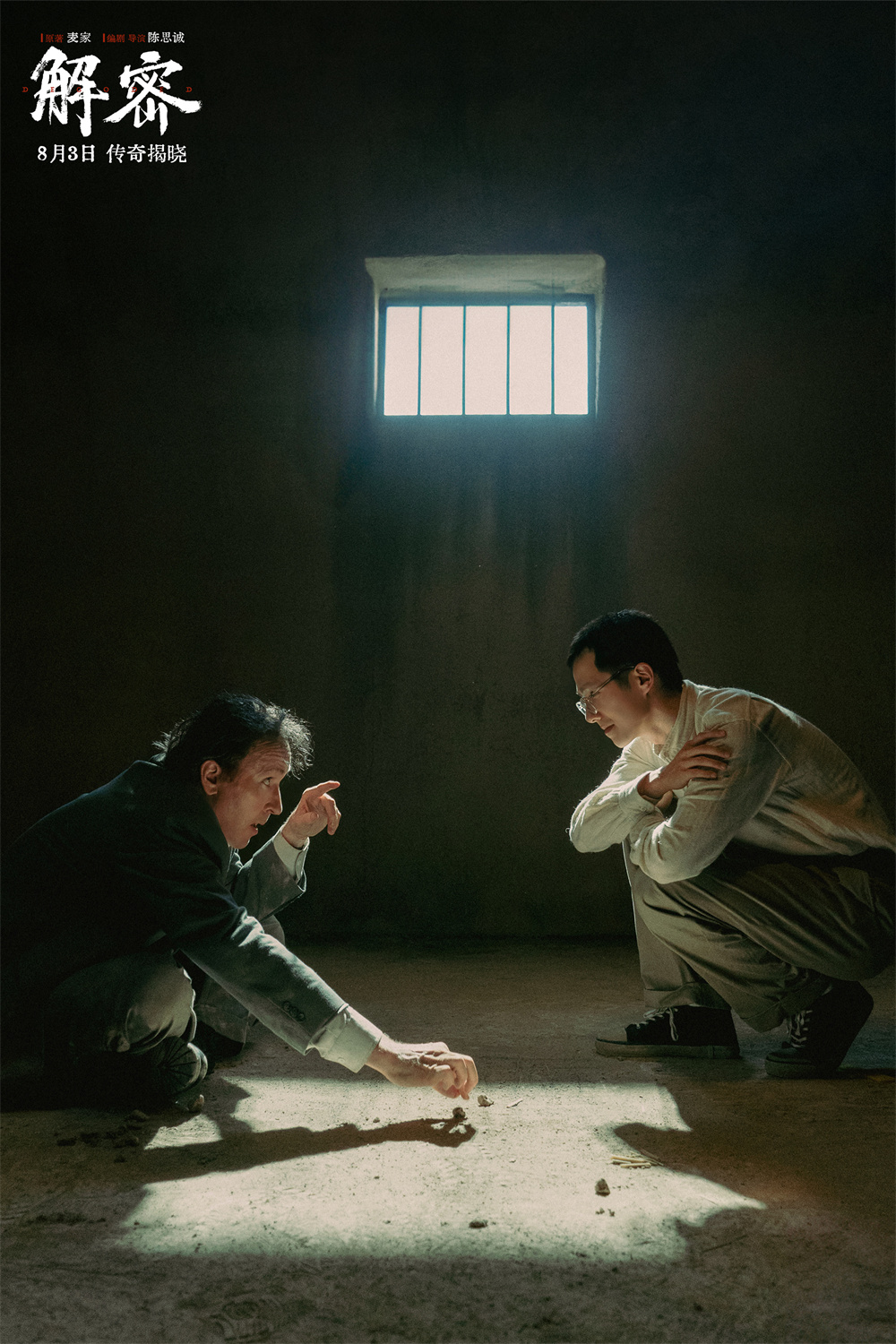
Rong Jinzhen and his teacher Seais (John Cusack) play chess
With these, the art team had a handle, and we expanded on this basis. Amusement parks are imported products. If we look at Shanghai World (amusement center), the facilities there are both Eastern and Western, so the entire design was gradually deduced.
The Paper : In the movie, Rong Jinzhen often cannot distinguish between dreams and reality. He turns off the lamp to confirm whether he is in a dream or reality. In the post-credits scene, the visitor you play and Rong Jinzhen look at each other in the mirror, but the lamp remains on. I think besides telling the audience that the movie is also a dream, what other implications can you share?
Chen Sicheng : In the movie "Decryption", we buried a clue, which is why Rong Jinzhen kept calculating pi on the notebook and on the glass. He had calculated to so many decimal places, why did he keep calculating? The value of pi is an irrational number, and it is usually believed that its value is infinite and non-cyclic. But if Rong Jinzhen found through calculation that it is a constant, it can be calculated to the end, and it can become a cyclic closed loop. Doesn't that prove that this world is virtual? It is pre-set.
Many scientists are now questioning the existence of this world. Through increasingly powerful computing power, they have discovered that this world is actually supported by a lot of very rigorous data. If these data are slightly biased, then this world will no longer exist.
But where do these precise calculations come from? I remember that British astronomer Fred Hoyle compared the probability of life forming naturally to "like a gust of wind blowing through a garbage dump full of scrap metal and forming a Boeing 747."
During the script writing and filming, I was also reading the biography of the Indian genius mathematician Ramanujan. This mathematical genius only lived to the age of 32. He left nearly four thousand mathematical formulas and theorems for future generations. Some of these results have been verified and have influenced the current cutting-edge scientific research. Many results are still like a mystery, as if they contain the mysteries of the universe.
In addition, during the creation stage of the script of "Decryption", everyone was restricted by the epidemic and was in a special period. I was also in a state of anxiety and thought a lot about the meaning of life. In fact, I finished the script of "Decryption" very quickly. I found that this script was particularly in line with my mood at the time, and I was very clear about what I wanted to shoot this time, which is now refined and emphasized in the movie: everyone is a unique code, and this life is a process of decryption.
Including the lyrics of the theme song of the movie, "Decryption", I rewrote a sentence based on the lyrics of the lyricist Tang Tian, "To get closer to the truth, it is in the maze behind the door." We are only approaching the truth, it is impossible to reach or possess the truth. In fact, this movie is to answer these confusions and thoughts of mine.
“I put my emotions into every single person in the movie”
The Paper : Liu Haoran, who plays Rong Jinzhen, is a young actor you discovered ten years ago. I noticed that this time you asked him to "completely break himself". We have also seen the huge change in his appearance in the film, but how to interpret the character's inner heart, can you talk about your guidance to him?
Chen Sicheng : The relationship between creators and works is a two-way relationship. While I am shaping the work, the work is also shaping me. This is also true for Liu Haoran. Many people say that I made Haoran successful, but it is not so deliberate. When I was making Detective Chinatown, the protagonists were an uncle and a teenager. I have known Wang Baoqiang for so many years, and he is the "uncle". At that time, I had just finished filming Beijing Love Story, so who would play Qin Feng? It just so happened that the "young man" Liu Haoran was around.
The same is true for the filming of "Decryption" this time. Haoran has also reached a time to break down and reshape himself. I am also an actor, and we all understand that it is not easy for an actor to encounter a role like Rong Jinzhen once in a lifetime. I told Haoran that after playing three "Chinatown Detective" movies, you may follow a certain trajectory and experience to perform, but to play Rong Jinzhen well, you must never use experience to replace perception. You must format yourself from the appearance to the inside, and you have to return to the original heart of an actor. Literary and artistic works ultimately express people. In fact, Haoran and I are a bit biased towards types. This is also the first time I have truly walked into the world of "people". Rong Jinzhen is such a special and rich person. You must pour out your original self and break it down.
This time I didn't deliberately talk to him about acting, but I helped him prepare psychologically for this role. He has been making various preparations from the beginning, from losing weight to reading biographies of various scientists. Many people don't know Haoran. He is a person with strong logic and rational thinking. That is not cleverness but wisdom, which is a particularly valuable condition for him to play Rong Jinzhen well. He plays such a genius and has that kind of persuasiveness, which is rare.
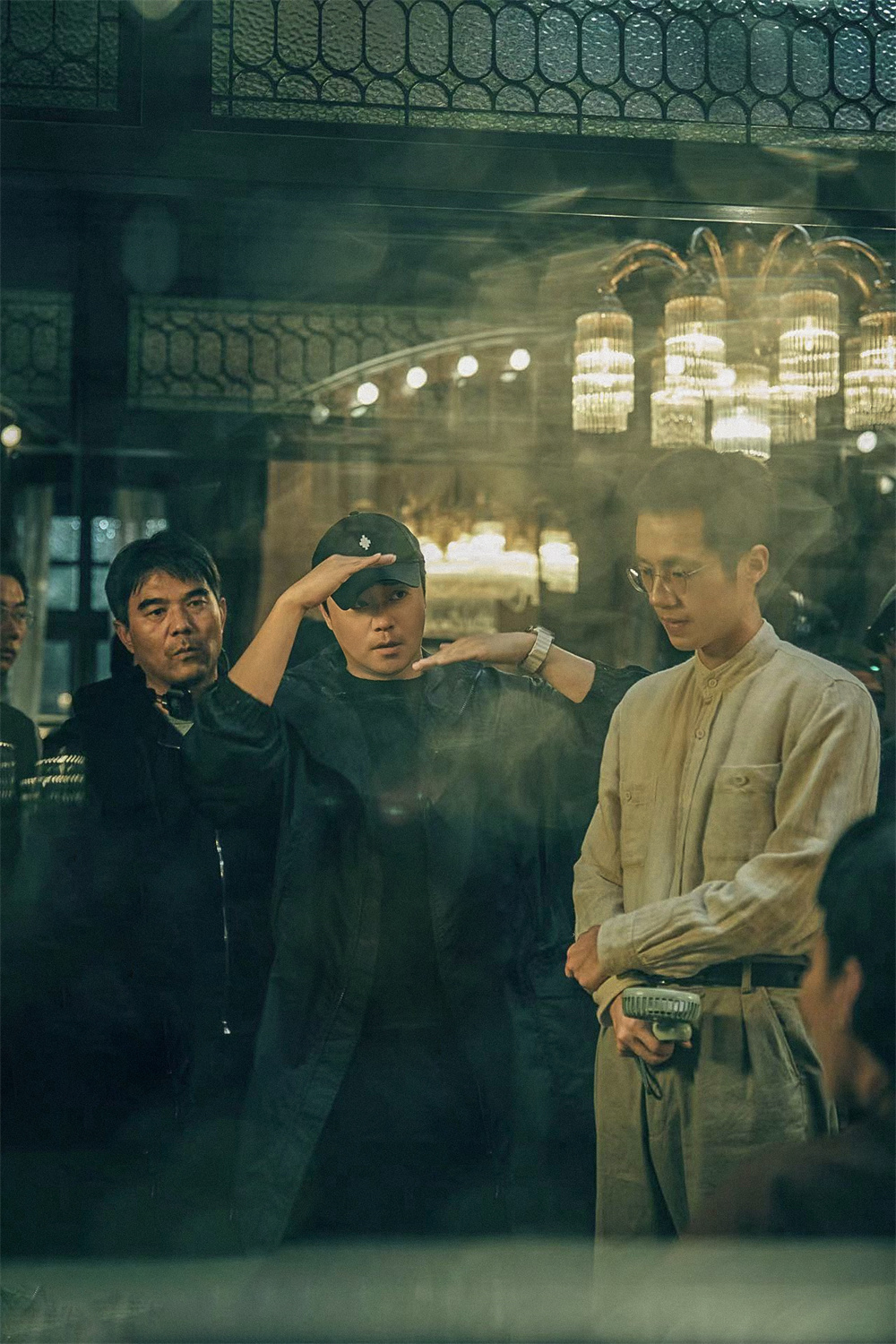
Director Chen Sicheng discusses the play with lead actor Liu Haoran on the set
The Paper : Regarding inviting Hollywood actor John Cusack to play Sheesh, can you tell us how you talked to him about the role?
Chen Sicheng : I have seen many of Cusack's works. He has a unique temperament, a perfect combination of melancholy and childishness, revealing a deep and complex personality. When he first joined the crew, he also expressed his confusion to me, not knowing how to play a mathematician. I told him, "It's okay if you don't understand mathematicians, as long as you understand artists."
When I was writing the script, the following words accompanied Schiess's appearance: "Some people say that mathematics is like art in the end. But I think they are wrong. Mathematics is art." Therefore, Cusack's Schiess must have the ultimate behavior of a pure artist. His performance on the set was also very good this time, and each scene and each line was presented differently. He himself said that he had not felt such a strong creative passion in Hollywood for a long time, and he especially liked our Chinese crew.
The Paper : Rong Jinzhen and Xi Yisi's "love-hate relationship" runs through the film. You set a key point at the beginning of their acquaintance. The two played chess and Xi Yisi stole a pawn. According to the rules of chess, a pawn can be "promoted to a soldier" when it reaches the bottom, which also foreshadows their future fate. At the end, Rong Jinzhen gave the credit for cracking the black code to his colleague Yan Shi (played by Zhou You), which was actually a kind of protection for his former teacher. Talk about the rivalry between these two characters.
Chen Sicheng : Not just the two of them, but every single person in the film, I have poured my emotions into. For me, there is no absolute black and white when it comes to creation. In this story, Rong Jinzhen and Xi Yisi are both geniuses, but they became opponents only because they served two different ideologies in such a special era.
This time we mainly show the contest between these two individuals. Just like the pawns you mentioned, they are setting and deciphering secrets every day. Their emotions are also mirror images of each other, and their fates are closely related. The so-called geniuses are highly confident and passionate about the careers they are engaged in, especially Xi Yisi. In the end, he raised this game to a kind of emotional struggle between a teacher and a student. This is the paranoia and loveliness of a genius, as well as his madness and pathos. In this regard, Rong Jinzhen is different from him. Jinzhen still has love for his family, his country, and the people around him in his heart.
It’s not just the relationship between Rong Jinzhen and Xi Yisi that’s interesting to ponder. The three men in the movie are like “fathers” to Rong Jinzhen at different stages of his life:
Xiao Li Li (played by Daniel Wu) was the first to discover Jin Zhen's talent for mathematics and gave him a warm home. He was a kind father; Zheng (played by Chen Daoming) was more like a strict father, who set rules for Jin Zhen and guided his life; Xi Yisi was both a teacher and a father. He affirmed Jin Zhen's talent and taught him many things.
The Paper : Chen Daoming has not appeared on the big screen for a long time. Can you please tell us how you invited him to play Zheng this time? On the set, did he contribute any details to the character?
Chen Sicheng : I remember that the last time Mr. Chen Daoming starred in a movie was in The Return. It was very difficult to find a role for Zheng. In my opinion, he must be both civil and military, have a high revolutionary belief, be able to stand alone on the covert front, and have considerable cultural accomplishment, so that he can work with the intellectual elites who have received higher education. In a word, he must be a person with rich background and aura. When I was writing the script, I put Brother Daoming in. I think this role belongs to him, and no one is more suitable than him.
Daoming has made a lot of contributions this time, and it is our honor to invite him to come out. Whether it is the character modeling or his overall performance, especially the performance in the final stage of the plot, his lines, "I am going to retire, my health is not very good. You should also go out for a walk, the world outside is still changing a bit", he said it seemingly calmly, but in fact it was powerful. When I talked about the characters with him, we felt the same way about Zheng, that is, he was such a high-spirited person back then, when he was in a special stage of history, he was also helpless. In fact, every character in the play is influenced by the times and will be swept away by the times.
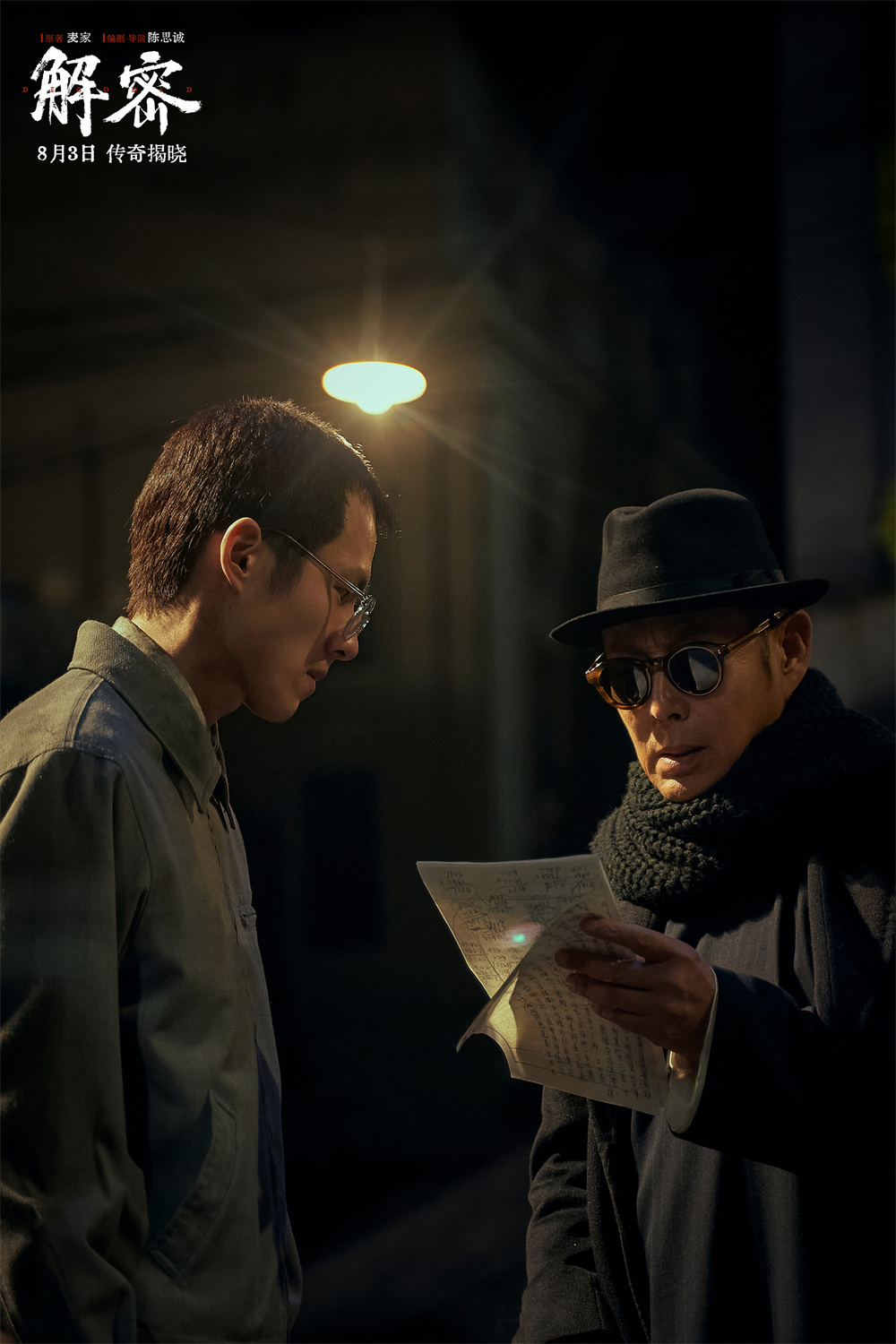
Rong Jinzhen and Zheng had a serious conversation.
The Paper : In Rong Jinzhen's personal emotional world, Rong Biyu (played by Chen Yuxi) is his mentor, and Xiaomei (played by Ren Luyao) is his ultimate partner. In particular, the combination of Rong Jinzhen and Xiaomei is also the key to his cracking of the purple code. The dreamlike interpretation is very beautiful and bold. What do you think?
Chen Sicheng : That's right. We showed Rong Jinzhen's emotional world in a hazy and beautiful way. Of course, there are also the most intense conflicts. I think the audience can have different opinions on this point when they go to the theater. This time we dramatically condensed some elements of life and attached these forces to him, so that he completed the advancement of growth. Since this movie is to show the growth of a teenager, his emotional world cannot be avoided. It's just a matter of how to strike a balance between them.
“Keep the audience in the theater with the best audio-visual experience”
The Paper : I remember talking to you about the “Tang Detective” series of films. You said that you valued a sense of “exaltation” when you chose to shoot in foreign lands. So back to “Decryption”, the novel actually covers a hundred years of history, and the film focuses on the period from the 1940s to the 1960s, which involves major historical events such as the explosion of China’s first atomic bomb. Can you talk about your presentation strategy?
Chen Sicheng : Including why I took the interview format of the original novel during the script stage, all these efforts are to make the audience believe this story. "Decryption" is a subject that Chinese films have never touched before, that is, these code breakers in the 701 Bureau, how they work and live. Rong Jinzhen in "Decryption" is fictional, but he has many characteristics of real people, and it also made me understand many great and ordinary people.
I want everyone to know that the reason why China has become a great power today is that there are too many unsung heroes who silently guard and support it. Due to historical and realistic reasons, their names cannot be made public until now, just like Zheng's line in the film, "The only thing I can tell you is that my last name is not Zheng." But the idealistic light in them is definitely not just a lonely orchid in the valley, but the real force that drives China forward. As literary and artistic workers, we have the responsibility to record and praise their stories.
In order to make everyone believe, "seeking truth" is one of the primary principles of our creation this time. In creating the environment of 701, we tried our best to be infinitely close to the real scene of that year. From costumes to props, our art team this time made great efforts to be realistic. We collected many old objects and reproduced many installations one-to-one. For example, the antenna built around the 701 building is a copy of the "cage antenna" used by the military in the 1950s. Our consultants and technical reconnaissance experts were shocked when they came to the scene to visit. There is also the machine used by Wang Baoqiang, which is commonly known as the "old K machine" by experts. The crew bought a real machine, and then the art team copied many of them one-to-one and put them there.
From the perspective of film aesthetics, this time we also used a lot of long shots to reflect the realism of the atmosphere. We tried to integrate the actors' lines and performances into the movement of these shots, reduce the number of cut points, montages, and inserted close-ups commonly used in contemporary genre films, and use authentic and credible scheduling to let everyone enter the story. This time the content expression is combined with aesthetic exploration. On the set, I also tried to reduce the presence of the "director" as much as possible. The actors' performances are immersed in an aura, and through the scheduling of the camera, the story is told in a leisurely manner, so long shots will be mainly used.
The Paper : The movie "Decryption" was shot entirely in IMAX. This is the second time you have used this shooting technology after "Detective Chinatown 3". Several dream scenes in the film, especially the scene where Rong Jinzhen and Xiaomei are in a large palace lantern-like scene, and he is deeply trapped in the distress of deciphering the black code and is in a maze chased by a huge rock, are all very impressive. Talk about the communication between you and Teacher Cao Yu.
Chen Sicheng : As you said, this is not the first time I have used an IMAX camera to shoot a movie. It is not mysterious in itself, but the amount of information given in this movie is particularly large, and how to balance the real and dream parts in it? The Alexa65 IMAX digital camera we used has a larger viewfinder with the same lens, and the amount of information captured is also more and clearer. Teacher Cao Yu is an expert in this field. He knows the sensor of this camera, which is the same as the effect produced by 65mm film. The image will be particularly solid, which not only presents the delicate performance of the actors in detail, but also shows the grandeur of a specific scene. So as long as the budget can support it, it will definitely be better to shoot like this.
Movies are what I believe in. I am particularly worried that they will be diminished by other modes of video consumption, so I have always emphasized the sense of cinema, and I must use the best camera equipment and the best audio-visual experience to keep the audience in the theater. This is what filmmakers should do, and I think this is very important.
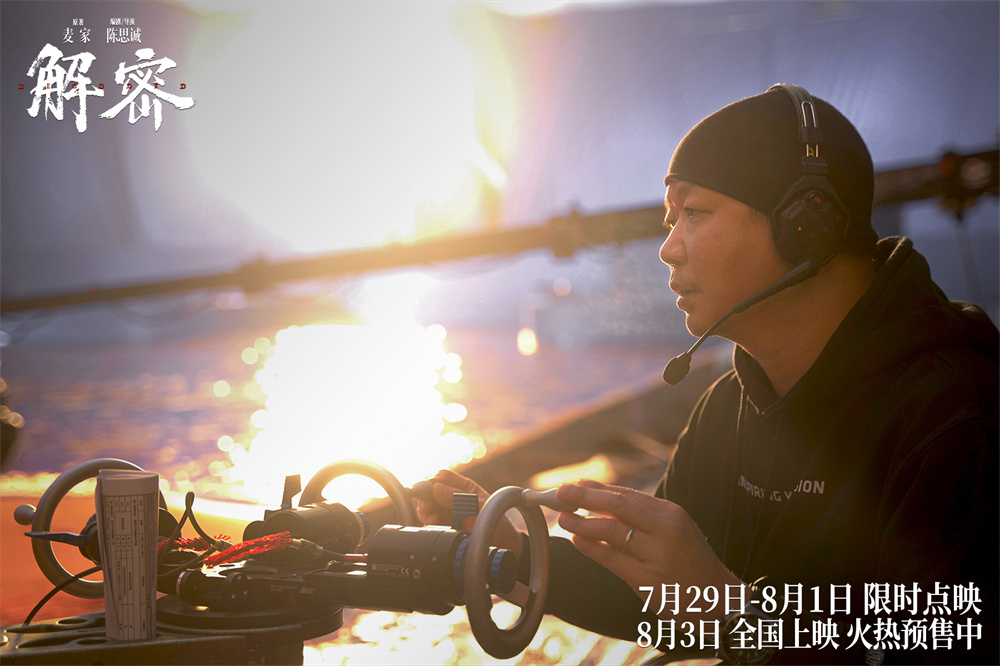
Director of photography Cao Yu of "Decryption" on the set
The Paper : There are ten dreams in the film, one of which is when Rong Jinzhen is in a dream. On one side, the model opera "Red Lantern" sings "I hold up the red lantern and it shines everywhere", and on the other side, the Beatles sing "I Am The Walrus". In the social context of China in the 1960s, this is definitely a stroke of genius imagination in film history. Which of these ten dreams do you think was the most difficult to shoot?
Chen Sicheng : Dreams are actually the externalization of psychological reality, and movies themselves are the art of dream-making. We also paid special attention to creating a sense of dream in the presentation this time. The dream you mentioned is a connection and transition between dreams and reality. It may only flash by on the big screen, but it explains the background of that era.
Speaking of the presentation of these ten dream scenes, the most difficult one to achieve from a practical point of view is the red beach at sunset. From the beginning, I wanted to complete this scene with real shots. I checked a lot of information and also found many beaches in the world. There are indeed pink beaches and dark red beaches. We imagined all possible on-site shooting conditions. In the end, the photographer Cao Yu said that it was impossible to shoot in natural light, so it became mainly studio shooting.
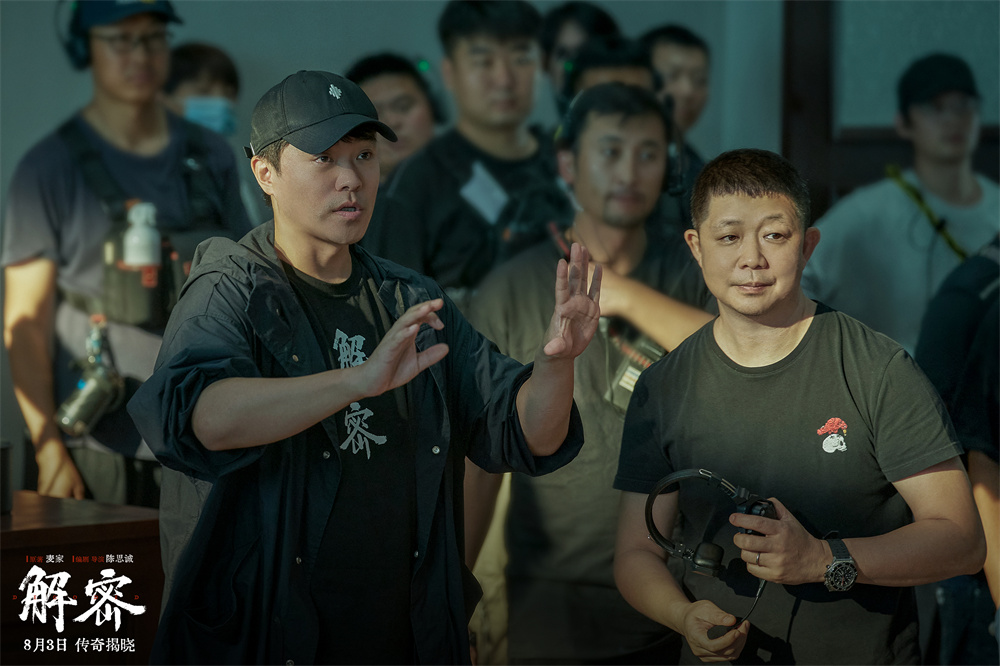
Chen Sicheng and Cao Yu on the set
Although it was a studio shoot, the crew built a beach scene in a 5,000-square-meter greenhouse, and dozens of tons of sand were real. This was a particularly huge project, and it took 90 days from production to shooting. The art department submitted dozens of sand colors and textures alone, and everyone held several meetings to discuss, including how the sand interacts with artificial waves and lights, and it took too many tests to finalize it.
I hope that this scene can capture the sunset, when the afterglow shines on the horizon, the scene of the sea and sky merging into one. The next question is, how to artificially create a sun? This time we cooperated with Nan Guang, a leading company in the field of photographic lighting, to develop a giant light stand, using a total of 75 LED lights to form a light matrix to achieve this visual effect. Teacher Cao Yu said that he had never imagined such a good effect before, and we are very proud of this picture.
The Paper : Why did Heath send the vinyl record of "I Am The Walrus" to Rong Jinzhen? We know that this is the most difficult song to understand among the Beatles' works. Including in the dream scene in the film, Rong Jinzhen and Heath finally played chess cross-legged on the beach. What does the huge walrus beside them symbolize?
Chen Sicheng : Because I am a big fan of the Beatles (laughs). We paid a huge copyright fee for the song "I Am the Walrus" this time, which is more expensive than the cost of using Michael Jackson's masterpiece "Heal The World" in "Detective Chinatown 3". It is very important to note that when Heys was teaching in China, he told Rong Jinzhen about his dream, saying that he dreamed of walking on the beach and encountered a huge marine creature. When masters fight, when he wants to defeat or disintegrate his opponent, he will use seemingly known information to mislead the opponent. Rong Jinzhen did fall into an infinite cycle of verification in this hint at the beginning.
As for what this walrus means? I don't want to explain it too clearly. In my opinion, it may be the beauty that we lose when we gain something. Geniuses also have their own life and death. Whether it is the chess pieces that Schiess stole during the game, the notebook that Rong Jinzhen stole, or the record that Schiess sent, they are all setting invisible "doors" for him. But when he realized that "the act of observation itself will also change the observer", everything became clear.
The Paper : The movie mentions the world's first general-purpose computer "ENIAC", and whether computers were involved in code making also caused a lot of trouble for Rong Jinzhen and his colleagues at 701. In reality, the film industry cannot escape the impact of artificial intelligence, especially the artificial intelligence video model Sora released by OpenAI in the first half of this year, which also made the industry exclaim. Do you also feel anxious about this?
Chen Sicheng : I am not that anxious about the development of artificial intelligence. Compared with nuclear weapons and nuclear leaks, AI is not more dangerous. On the contrary, I think that the disordered development of the Internet, all kinds of information are mixed together. Regardless of whether the information is true or false, if we just immerse ourselves in fragmented reading, our ability to actively search and think will continue to weaken. This passive acceptance and guidance, to put it seriously, may even be led to an unknown direction by anti-intellectual things. There are many things that we know are wrong, but we seem to be caught up in them. So what should we do? I don't know. I think this is a more immediate danger to humans than the development of AI.


